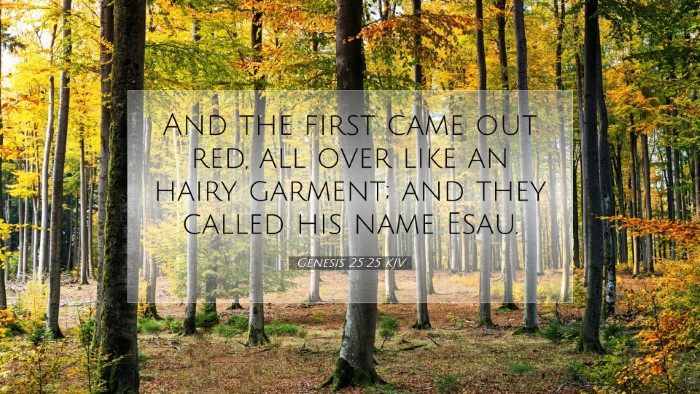Commentary on Genesis 25:25
Verse: Genesis 25:25
“And the first came out red, all over like a hairy garment; and they called his name Esau.”
Introduction
Genesis 25:25 introduces us to Esau, the firstborn son of Isaac and Rebekah, marking the beginning of pivotal events associated with him and his brother, Jacob. This verse is laden with significance, reflecting not only the physical attributes of Esau but also the theological implications tied to his character and legacy.
Physical Description
According to Matthew Henry, the mention of Esau's physical appearance (“red, all over like a hairy garment”) is exceptional and serves to underscore the nature and identity of the individual. In ancient Hebrew culture, the description of hairiness can denote a robust and vigorous nature. This physical characteristic may also foreshadow Esau's wild and untamed personality, a theme prevalent throughout his life.
Significance of the Name “Esau”
The name “Esau” itself bears great significance. Adam Clarke notes that the name is derived from a word meaning "hairy" but is also related to the Hebrew word for "made" or "completely formed," suggesting a completeness in his physique. This dual implication highlights the way in which names in Hebrew culture were often reflective of the individual's characteristics or destiny.
Theological Implications
The birth of Esau is a crucial moment in biblical theology, as it lays the groundwork for the complex relationship between him and his brother Jacob. Albert Barnes emphasizes that the differences between the two brothers are symbolic of the broader struggle between flesh and spirit, a motif that reverberates throughout Scripture.
Esau's emergence as the firstborn positions him within the lineage of promise, yet his choices and lifestyle later reveal a disregard for his birthright and blessings. The description of him as “red” and “hairy” can also symbolize the carnal nature, illustrating the contrast between spiritual and physical pursuits.
Contrast with Jacob
The opening of Genesis 25 sets the stage for the contrasting identities of Esau and Jacob. While Esau is depicted as ruddy and a man of the field, Jacob’s portrayal aligns more closely with domesticity and spiritual pursuits.
- Esau: A skilled hunter, embodying earthly desires and a focus on the tangible.
- Jacob: A quiet man dwelling in tents, representing a focus on spiritual legacy and the divine promise.
This contrast is critical for understanding the unfolding narratives of Genesis, particularly how divine favor is not automatically aligned with birth order but often shows God’s sovereignty in choosing the unexpected.
Reflection on Legacy
As pastors and theologians reflect on this narrative, the implications of Esau's character—represented through his physical traits—serve as a cautionary tale regarding the value placed on temporal pleasures over eternal spiritual blessings. The story continues to unfold, illustrating that Esau’s immediate gratification would overshadow the legacy he could have had as the bearer of the Abrahamic covenant.
Conclusion
Genesis 25:25 introduces us to Esau, whose description hints at his future conflicts and character. This verse is a foundation for themes of estrangement, the consequences of choices, and the workings of divine providence. As students of scripture delve into this passage, they are encouraged to consider not only the historical and cultural context but also the rich theological significance contained within this verse, pondering how these timeless truths apply to contemporary contexts.


